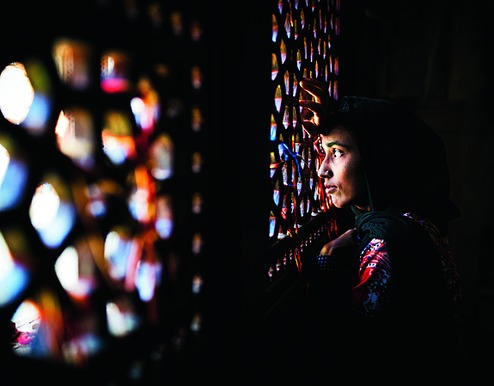
Faiqa Mansab's debut novel tries to achieve a hybrid of Virginia Woolf and Jane Austen infused with Sufi mysticism in an urban Pakistani setting. This is manifestly not an easy task and the novel falls predictably short of its considerable ambitions.
The setting is modern-day Lahore. Nida, an upper class, "intelligent" and convent-educated housewife trapped in a loveless marriage, leads a double life roaming the "poor" quarters of the city incognito. She sits in Daata Saheb's dargah, hoping to meet inner peace. This comes in the form of the flute-playing transgender, Bhanggi, who lives in the dargah as a qalandar or holy man. Abandoned at birth, Bhanggi cannot identify with his adoptive community because he desires women rather than men. The protagonist of the subplot, Sasha, is a middle-class housewife whose lust for designer labels leads her to a different kind of double existence in adulterous liaisons with influential men. The story of the rape of Sasha's bookish, teenaged daughter, Zoya, acts as the narrative catalyst, precipitating the tragic but inevitable climax. In this story of unlikely alliances and unavoidable betrayals (of gender, class and ideals) the spur to every kind of action is a yearning for "love". The author is of the firm belief that love equals meaning in life, and the only "true" love is spiritual.
Mansab's novel is ostensibly about the inadequacies (and inconsequentiality) of physical bodies in the discourse of love. The book's title and epigraph allude to a lyric in the Diwan-i Shams-i Tabrizi in which Rumi's lyric voice speaks of the self as an artist striving to create meaning without success, since the corporeal body lacks signification until the divine beloved penetrates and possesses it. For Mansab, reading Rumi, bodies are loci of transgressive desires that limit the self and hold it hostage to society and commerce. In long inner monologues of platitudinous prose Nida holds forth on this position. But Nida's desexualization is not, as one would expect, a spiritual sublimation. It is a direct result of the aforementioned marriage. "Every day I told myself I wouldn't go back. Yet, I returned home daily... The Sufi path I was so desperately seeking promised me limitless peace, if I could only annihilate the Self, pray and live an abstemious life of piety. I wasn't quite sure what piety meant... Was it 'obedience' to a husband whom one knew to be wrong? Just one more product of the social construct, if Marx was [ sic] to be believed". It is heartening to see that convents in Lahore give their pupils a nuanced Western education.
Spiritual quest notwithstanding, Nida and Bhanggi's love moves steadily towards physical consummation. "Why was I then letting this hijra do things only Saqib was allowed to do?" asks Nida even as she succumbs. While "Bhanggi, in silent awe and reverence, made love to a body I'd long abandoned as unimportant and irrelevant", for Nida, "[t]here was no guilt and no pleasure... In having him claim [my body] for me, I claimed him as well." Does Mansab, then, seek to justify her thesis of Rumi-inspired love by infusing Bhanggi's transsexual body with otherworldliness? The pejorative contrast Nida draws between her husband and "this hijra" at the moment of "spiritual" conjoining is revealing. Love seems to have taught this woman nothing at all.
Bhanggi's treatment is possibly the most unfair and disturbing element of the novel. The heart-wrenching potential of his predicament is systematically thwarted. He does not look like a hijra and is therefore not a challenge to Nida's smugness. His body is the site of both holiness and filth, but the power of this long-established paradox is inadequately explored. Bhanggi's infatuation with Nida reads like the moonings of a lovesick hormonal teenager but he feels no rage or fear, and thus arouses none in his readers. Nida's solipsistic fantasy of emancipation through love cannibalizes Bhanggi until he is reduced to literally nothing but a ghostly echo in her mind.
Mansab's execution, therefore, does not do justice to an innovative plot idea, although the novel does have its moments. There are occasional eloquent turns of phrase, insightful glimpses into characters' minds (especially the adolescent female mind) and a halfway-decent Austenian attempt in chapter 19 at uncovering elite hypocrisy. This bijou social satire eschews any engagement with wider politics though. Nida's husband's status as an influential politician is relevant only because it reveals her lack of agency and gives him access to thugs. The style is at once flat and uneven. Each chapter is guided by a character's point of view but they all sound the same. Much is made of the city but the spaces lose voice in the white noise that is Nida's mind. Tighter editing could perhaps have helped. The novel as it is does not deserve its length. It does not, after all, have anything important to say.










